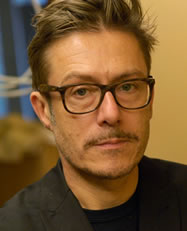
FESTIVAL/TOKYO
Performing Arts Festival launching from Tokyo

The Ruhr Trilogy
The Ruhr area in the west of Germany experienced rapid economic prosperity during the latter half of the nineteenth century as a heavy industries and coal-mining district. However, since the Seventies, as demand for coal declined it has become the most prominent place in Germany for social problems, such as unemployment, caused by industrial change. German writer and director René Pollesch has since 2008 staged his "Ruhr Trilogy" annually for 3 years in this area that so symbolizes the end of industry and the dilemmas of changing social structures.
Pollesch will bring Part 2 to Japan, inspired by Roberto Rossellini's "War Trilogy" ("Rome, Open City" [1945], "Paisà" [1946], "Germany, Year Zero" [1948]), shot in the ruins of bombed-out cities in Europe. Taking motifs from Rossellini's Neorealism, which so shocked people around the world for its images of war's destruction and fear, Pollesch utilizes old cinematic dialogue and situations, in order to question the binaries of truth and fiction, history and the individual, and the city and the country.
For the staging a film set will appear in a giant vacant plot in Toyosu. There the cast of 5 men and women - the "film crew" - arrive to start shooting. However the film's characters, story and scenes are somehow not clear. Was this wasteland once an industrial area of the Ruhr district? What is Rome's massive film studio "Cinecitta"? What is it that the cast is actually filming? Between film and theatre a strange fiction unfolds.
Shouted monologues, continuous fun - but also latent, complex examinations of reality
Pollesch challenges the boundaries of theatre through the themes of our contemporary lifestyles: metropolitan life, twenty-first century labour, capitalism. In the plays that he writes and directs quotations from both academic debate and television variety shows intermingle, creating a dynamic, powerful and at times even hysterical worldview.
While drawing on representations of the symbols of capitalism like outsourcing, globalization and networking, his work tackles our society's dilemmas and contradictions generated by the media and capitalism, and the characters who appear are modern people always pursued by the need to respond to its demands and expectations. They tell bad jokes, get violently angry - they attempt to grasp and confirm the actuality of the world that is engulfing them, and yet they can never find "life" and the "story". They are people who are always searching for those things.
Overwhelmed by the unfolding high-speed spectacle and at times slapstick scenes, the audience bear witness to Pollesch's poignant anger and complex contemplation of the numerous problems embracing us today.
Bert Neumann's set design - a temporary theater space connecting the city with the suburbs
The stage design for "Cinecittà Aperta" has been created by Bert Neumann, one of the most accomplished designers in German language theatre today. For the "Ruhr Trilogy" Neumann used the "Rolling Road Show" set originally created for the 2000 Hannover Expo. The RRS is a transportable container theater with tents, container stages and a camping car, and was a project connecting the centre of a city with the suburbs. The experiment in creating something in a temporary public square unimaginable inside a theater building further constructs new encounters and relations between the performance's cast and crew, as well as the visiting audience members and the residents of the area where the land is located.
The Tokyo performances will be at a vast vacant site in Toyosu. Against a backdrop of the buildings of the capital, Neumann's bold outside space opens up new possibilities for theatrical spaces.

Bert Neumann
Set Designer
Bert Neumann was born in Magdeburg in 1960 and grew up in East Berlin. He has worked together with - among others - the directors Frank Castorf, Leander Haußmann, Alain Platel, and Johan Simons. Together with the agency LSD, he developed an image campaign for the reopening of the Volksbühne am Rosa-Luxemburg-Platz in Berlin in 1992, and has been its chief stage designer since then. Among the awards he has received are the Critics Prize of the Berlin Newspapers, the Kainz Medal of the City of Vienna (both in 2000), the Berlin Theatre Prize of the Prussian Maritime Trade Foundation (2003), the Stage Designer of the Year award of the journal Theater heute, and the Nestroy Prize for Best Stage Design. Since 2009, Bert Neumann is a member of the Academy of the Arts, Berlin.


